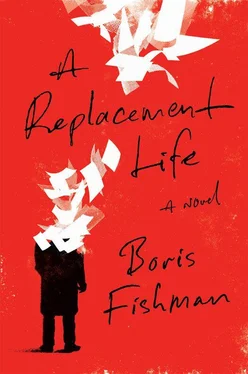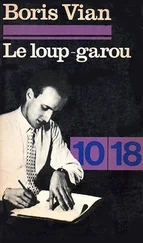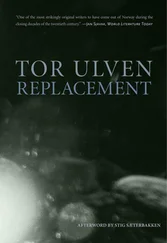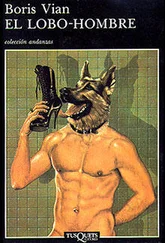He stood by Israel’s hospital bed. “Do you need a book?”
“I came prepared,” Israel said, and nodded toward the locker. “Come closer.”
Slava leaned toward Israel’s face. It smelled of cellars, mushrooms, earth. Israel’s hand enclosed Slava’s, and lifting his head, the old man laid a pair of blue lips on Slava’s forehead.
“You didn’t send it out in time, did you?” Slava said.
“I’ve had a little attack here,” Israel said, “but I’m not brain-dead.”
Slava smiled.
“Go forth, my son,” Israel said.
THURSDAY, AUGUST 31, 2006
The New York headquarters of the Conference on Material Claims Against Germany was neighbored by the offices of German economic initiatives and foundations, as though these could not rightly proceed with their business without a reminder of what their forebears had wrought. Where had this gray-haired man, a lanyard swinging over his bow tie, been? What had he done? Or not done.
The woman at the front desk, her cheekbones as sanded as a promontory and a bundle of black hair bridled by a zirconia-studded barrette, was whispering to someone in Russian on the telephone. Lyudmila, a nameplate made clear. She smelled of clothes freshly removed from the closet. On sighting Slava, she extended a manicured finger toward a red leather chair without interrupting her conversation. Slava tried to gather his thoughts, but they refused to stay put, and he simply gazed at the oatmeal-colored carpet.
Ten minutes later, he still hadn’t been called. Apparently, as far as Otto was concerned, Slava could have risen and gone four ways at once. When he inquired with Lyudmila, she reminded him that “he will see you very soon, please” and indicated once more the red leather chair, into which Slava hopelessly sank.
When Slava was finally led into Otto’s office, the big man rushed over to pump Slava’s hand and apologize for the wait. “Everything is upside down because of the renovation,” he said, mashing Slava’s palm.
Slava looked around aimlessly. He hadn’t noticed anything amiss in the hallway.
“No, it’s not important, it’s not important.” Otto waved him in. He beamed at the receptionist, as if it were an achievement to have a personage such as Slava in his office. “Thank you, Lyudmila.” He turned back to Slava. “Coffee, would you like, tea?”
“Coffee,” Slava said weakly, and Lyudmila nodded with elaborate competence.
The vaguely classical motifs inscribed on the wood paneling in Otto Barber’s office lent it a conservative authority that was undercut by the same oatmeal carpet and rec-room love seats. It looked as if the receptionist had made her own trip to the furniture emporia in lower Brooklyn. A triumvirate of miniature flags — Germany, Israel, and the United States — decorated Otto’s desk.
If they had Russians, why had Slava been given the German? he wondered. Had the Conference done research and determined that one of his own was less likely to make an impact? Had the “suspect’s past rejection of his community” been highlighted in the report? “Mr. Gelman maintains an adversarial attitude toward people from his community. It may be more productive to present him with someone from a neutral or unfamiliar background.” He could have written it for them.
Having deposited Slava in a leather chair on the other side of his desk, Otto sank into his own and pointed at the air-conditioning panel behind him. “Is it too cold for you? I am an arctic person at heart.”
Slava shook his head weakly.
“Mr. Gelman, I can’t hide my excitement to see you. But you, it seems, could be more excited to see me!” Otto sniggered.
“You weren’t concerned I’d run off?” Slava said, trying for defiance.
“That’s very funny!” Otto said. “It’s very funny that you are thinking this way. No, I knew you would not run away.”
“Why is it funny?” Slava said. “Were you so sure?”
“Well, perhaps it is because you are innocent!” he laughed. “You seem to be not considering that possibility yourself!”
Slava hung his head. “You have your evidence,” he said derisively.
“Incorrect! You have the evidence. You hold all the power. And so if I say, ‘You must come to me tomorrow,’ pathetic! I don’t have the power to make you do this. You must come when you want to come.”
Slava’s forehead was clammy with sweat, but he didn’t dare acknowledge it by swiping at it.
“Then again, I have read that a good investigator begins from far away. Misdirection is the word. And then he jumps like a jaguar!” Otto tore out of his chair. “So perhaps I am catching you! With the fish. How do you say.”
“Baiting you,” Slava said morosely.
“Yes,” Otto said, settling back in his chair.
Lyudmila walked in with a tray bearing implements for coffee for one. The tiny spoon clinked against the porcelain cup in her hands. She disappeared as quietly as she had arrived. Otto rubbed the space between his eyebrows.
“Did you bring the china with you?” Slava said, sitting up. He coughed self-pityingly and tried to focus.
Otto looked up. “I’m sorry?”
Slava pointed at the coffee cup. “Is it German?”
“No. I do not know, to be honest. I can find out,” Otto said, leaning toward the intercom.
“We had a set of German china when we lived in the Soviet Union,” Slava said. “My grandfather collected china. This one set from Germany was his prize possession. Cobalt with gold trim. He had to leave most of it behind because there was a limit on how much we were allowed to take with us, but there was no question this set was coming. My grandmother wrapped it up in newspaper. That bundle was half as big as a person. We trundled it all over Europe.”
“Mm-hmm,” Otto nodded.
“When we finally got to JFK, we relaxed,” Slava said. “My uncle was meeting us at the airport. Everybody was crying and hugging. He wanted to show us he was a big man already, he could take care of things. So he picked up the suitcase and threw it into the porter’s cart. We all froze. We all thought the same thing.”
“No,” Otto said. “They were broken.”
“Only one. When we got to my uncle’s house, my mother and grandmother went into the bedroom to check. Only one cup had broken. The rest were okay.”
“Well, that is good luck,” Otto said. “But you see, the manufacturing in Germany is superb. If my father could hear me now. It was his wish that I pursue a position in the private sector instead of the government.”
Slava didn’t respond. It was unpleasant to think of Otto’s father as also a father.
“So, Mr. Gelman, you have rushed in almost the very next day,” Otto said. “Two days later. Why is it so? Was the guilt tickling your nose hairs?”
It must have been an expression in German. “I wanted to help,” Slava said feebly.
“Yes, we are talking about something very important,” Otto said. He rose from the chair and strode toward the window. The sky had become overcast again: the unreliability of late summer. “Tell me now, Mr. Gelman,” Otto said gravely. “Tell me everything.”
Slava listened to the muted honks rising from the street. “What do you think I should do after this, Mr. Barber?”
Otto turned around. “Are you leaving the magazine, Mr. Gelman? I think you can do anything. This is beneath you. Maybe you should go to a different place. New York City does not feel like your natural condition.”
“I would like to see Lubbock, Texas.”
“This would certainly classify. It is different from New York, you can say that.”
“You know it?” Slava said.
Читать дальше











